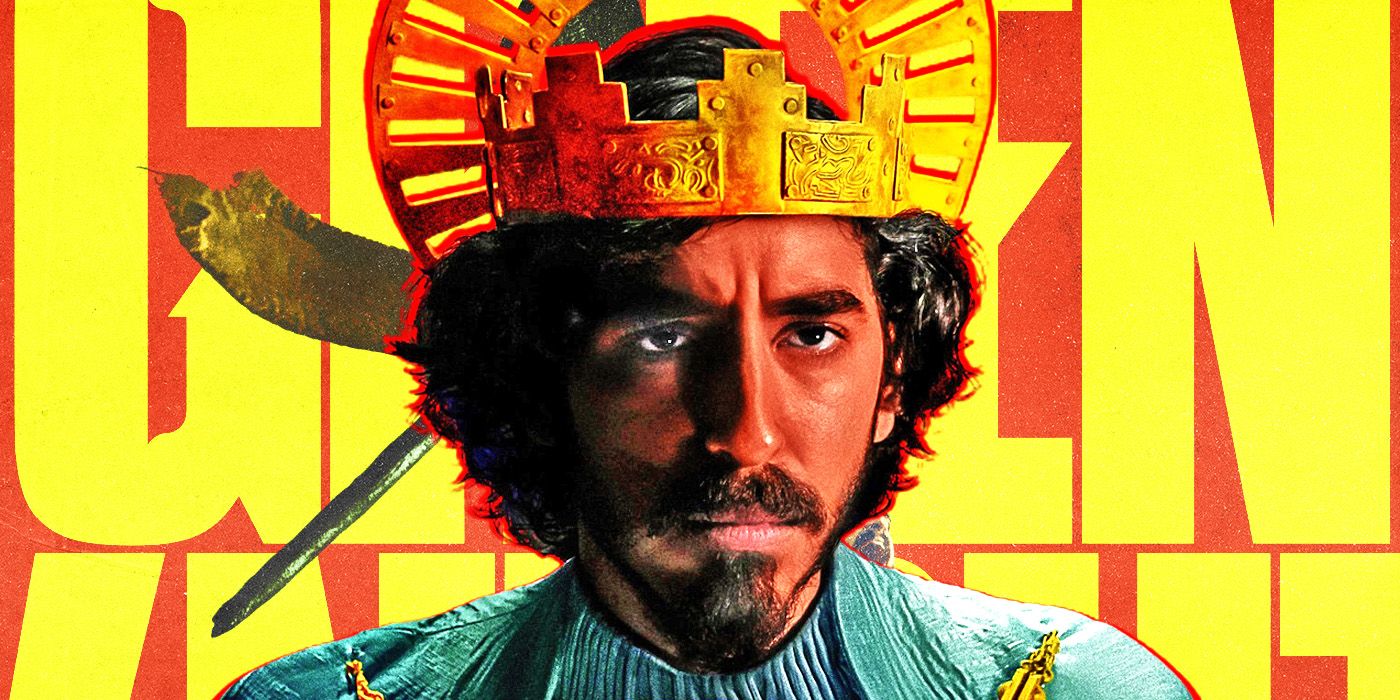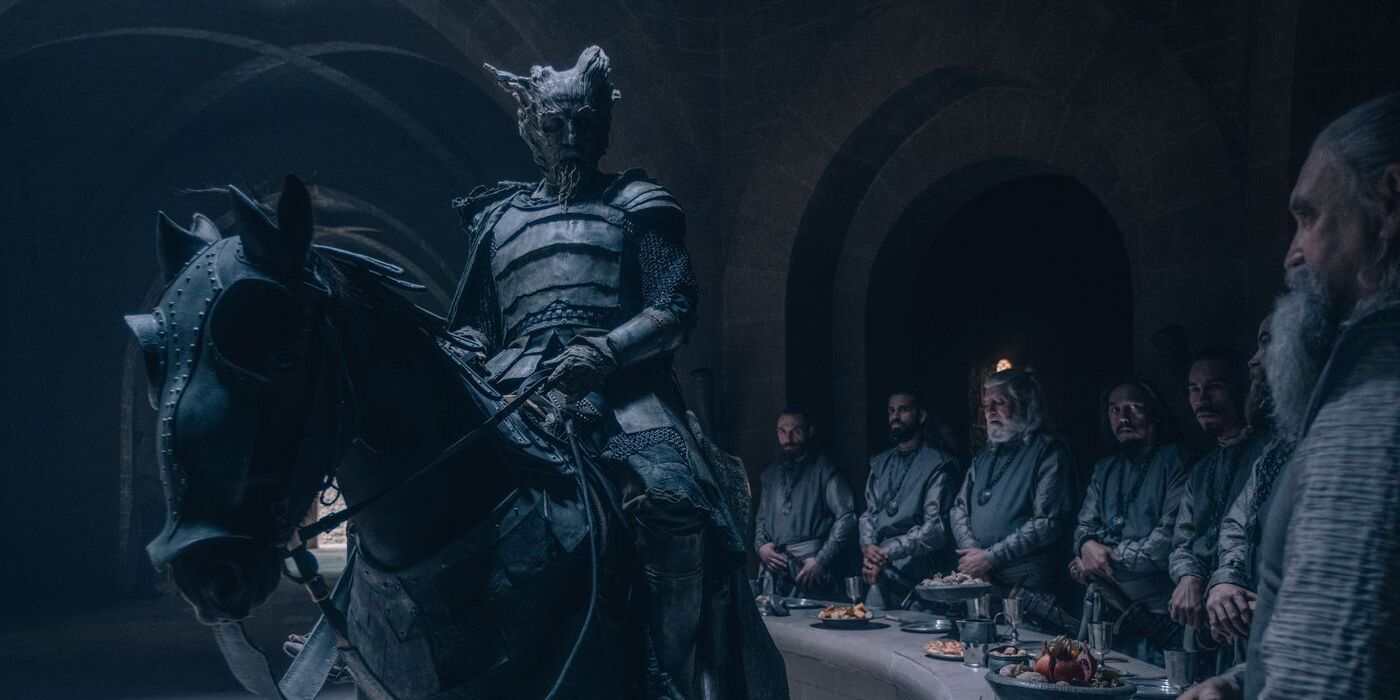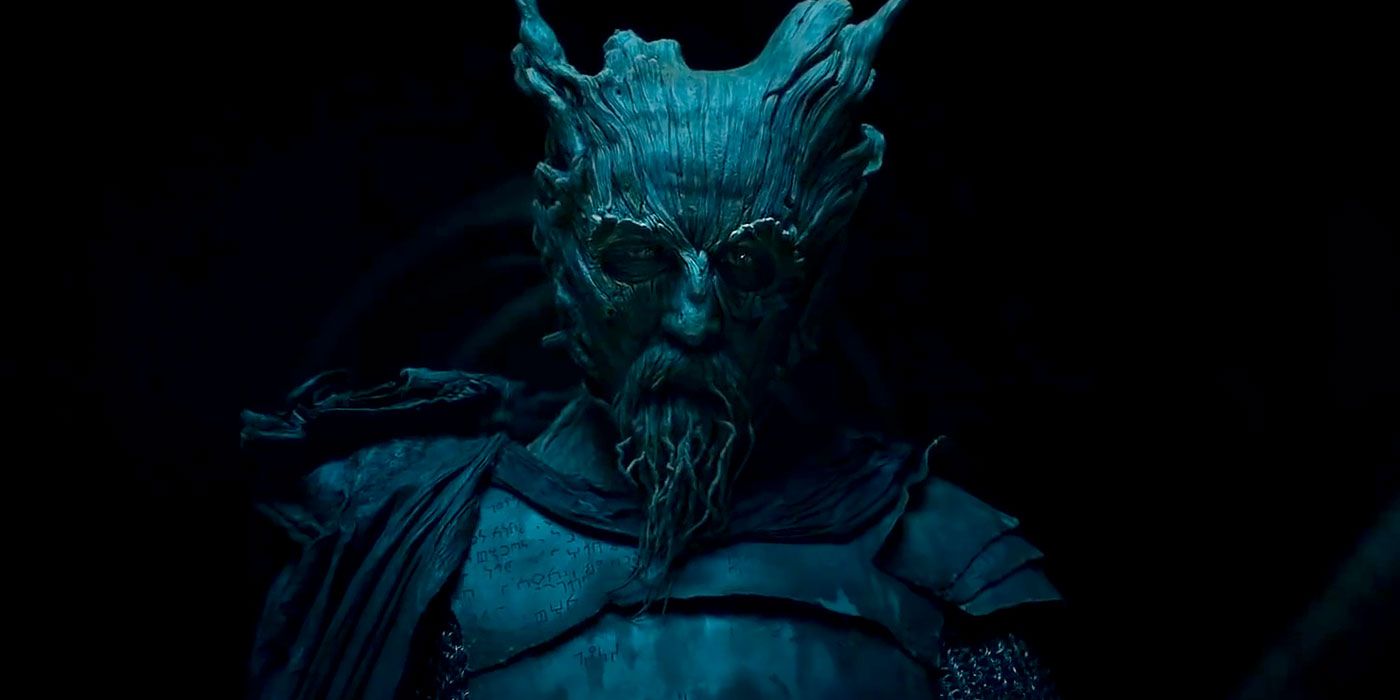Summary
- The Green Knight offers a vivid retelling of the epic poem Sir Gawain and the Green Knight, posing questions of honor and morality.
- The Green Knight explores the chivalric themes of Arthurian legends, emphasizing honor as a choice amidst moral ambiguity.
- The Green Knight serves as a cautionary tale about humanity's treatment of nature and an examination of life as both a curse and a gift.
A24's The Green Knight delivers a surreal look into a renowned Arthurian legend, spicing up the hero's journey with clever symbolism and hidden meanings. The movie is a mostly faithful adaptation of the Arthurian legend, Sir Gawain and the Green Knight, an epic poem from the 14th century. It follows Sir Gawain, King Arthur’s reckless nephew, who sets out to meet a distressing fate after the mysterious Green Knight challenges him.
David Lowery — who wrote, directed, edited, and produced The Green Knight — is known for films that are as atmospheric as they are difficult to parse. Much like the source material, The Green Knight offers plenty of room for interpretation through its ambiguous battle between good and evil.
Updated on April 29, 2024, by Arthur Goyaz: The Green Knight continues to ignite heated debates around its hidden symbolism and ambiguous ending. This article was updated to further analyze Loewery's movie adaptation and to bring the article to current CBR formatting standards.
A Flawed Man's Quest To Become Honorable
|
IMDb |
Tomatometer |
Where to Watch |
|---|---|---|
|
6.6 |
89% |
Stream on Max |
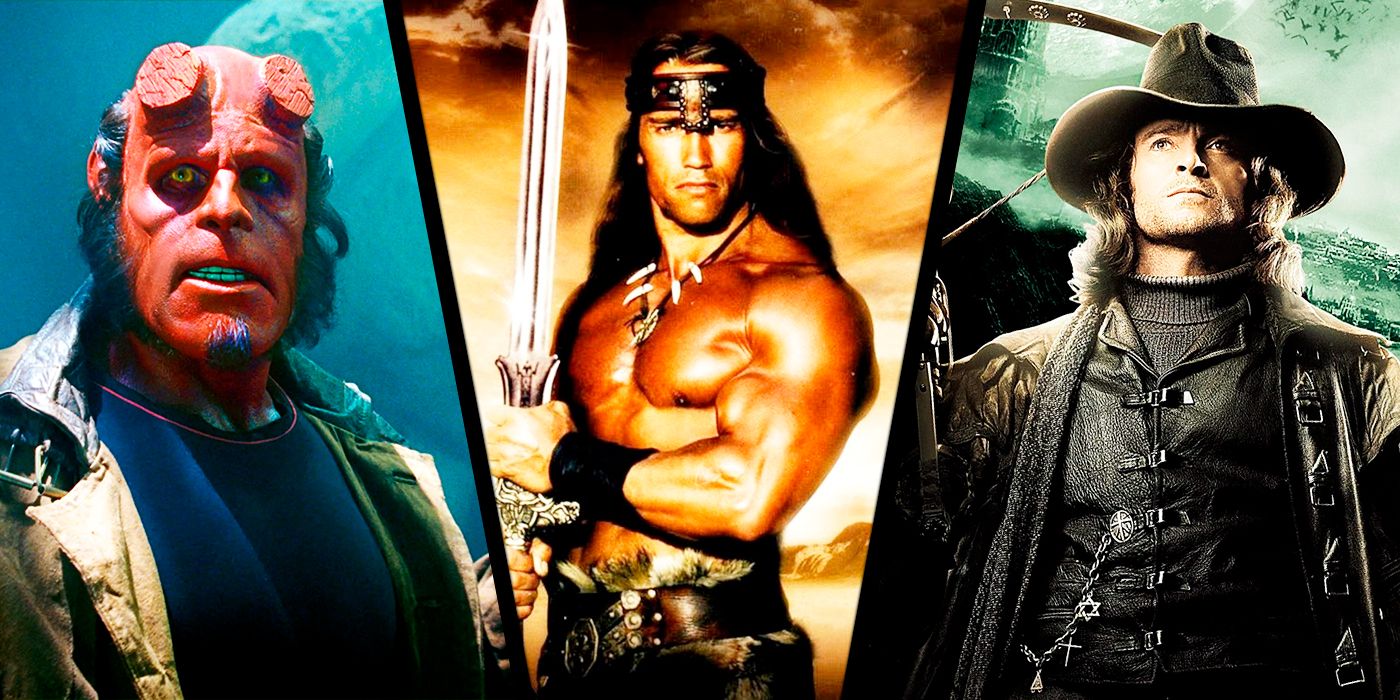
10 Best Dark Fantasy Movies
Movies like Conan the Barbarian or Van Helsing fully embrace and show the best of the Dark Fantasy movie genre.The Green Knight is one of the best fantasy movies of the 2020s yet, and its plot is deceptively straightforward. Gawain spends his time and money at taverns and brothels, to his mother's shame and disappointment. When he's invited to sit alongside his uncle, King Arthur, at a Christmas celebration, he realizes that, unlike many of the other noblemen in the castle, he has no grand story to tell as evidence of his value. Just then, the titular Green Knight materializes, a mysterious character with a wild appearance and green complexion. He challenges someone to join him in a game. Whoever accepts can land a blow, but he'll return it just as he took it in one year's time. Gawain volunteers and, misunderstanding the point, beheads the Green Knight, who does not die.
The Green Knight, like the poem, doesn't provide definitive answers, but it does explore similar key themes. Since The Green Knight is based on a centuries-old story, it makes sense to interpret it through the lens of the morality of that time. Sir Gawain and the Green Knight is often classified as a chivalric romance, the point of which was to emphasize a knight's heroic qualities. At the start of The Green Knight, Gawain — who is not yet a knight, in a change from the source material — lacks all of those qualities.
Gawain fails the Green Knight's test; a cleverer combatant would've only inflicted a scratch and received a scratch in return. When he finds a scavenger on the battlefield, he is neither observant enough to detect his trap nor generous enough to pay him for his information. When Gawain is attacked, he's unable to defend himself. Next, he encounters the ghost of a lady who has been raped and beheaded. Rather than help her for chivalry's sake, he expects a favor. Finally, at the Lord and Lady's castle, Gawain not only can't resist the Lady's sexual temptation but he also double-crosses the Lord whom he bargained with. These deceptive, morally ambiguous details make up Gawain's journey to the Green Chapel, but there's a hidden truth underneath his quest's intent.
Sir Gawain And The Green Knight Have A Lot In Common
Gawain is self-interested and weak, and his word is practically worthless. On the surface, the character goes against everything a respectable hero evokes. However, the deeper meaning behind Gawain's archetype works as the synthesis of the Arthurian legends: there's only one thing that matters, and that thing is honor. At the start of The Green Knight, everyone is shocked when Gawain misinterprets the Green Knight's challenge and sentences himself to death. However, the encounter with the Green Knight in the end suggests that it was all a test to find a man brave enough to embrace death against fate's wish.
Gawain's journey is an examination of how honor flourishes in men. It's not a given, but rather a process. His quest deconstructs the inherently brave hero, showing the hero's vulnerability in detail, be it in times of distress, insecurity, or fear. In that sense, Gawain and the Green Knight are very similar. The Green Knight challenges the preordained: he's there to dictate the fate of men should men choose to comply.
Fate, essentially, is already written, as opposed to the Green Knight, who gives warriors the choice to outrun destiny in the face of death. The Green Knight himself doesn't die. Both Gawain and him represent an opposition to nature, and although the safest conclusion to The Green Knight is that Gawain died in the end, Lowery makes sure to leave it open for audiences to chew on the conclusion's deeper meaning.
The Pointlessness Of Old-World Chivalry
|
Character |
Played By |
|---|---|
|
Gawain |
Dev Patel |
|
The Green Knight |
Ralph Ineson |
|
Essel |
Alicia Vikander |
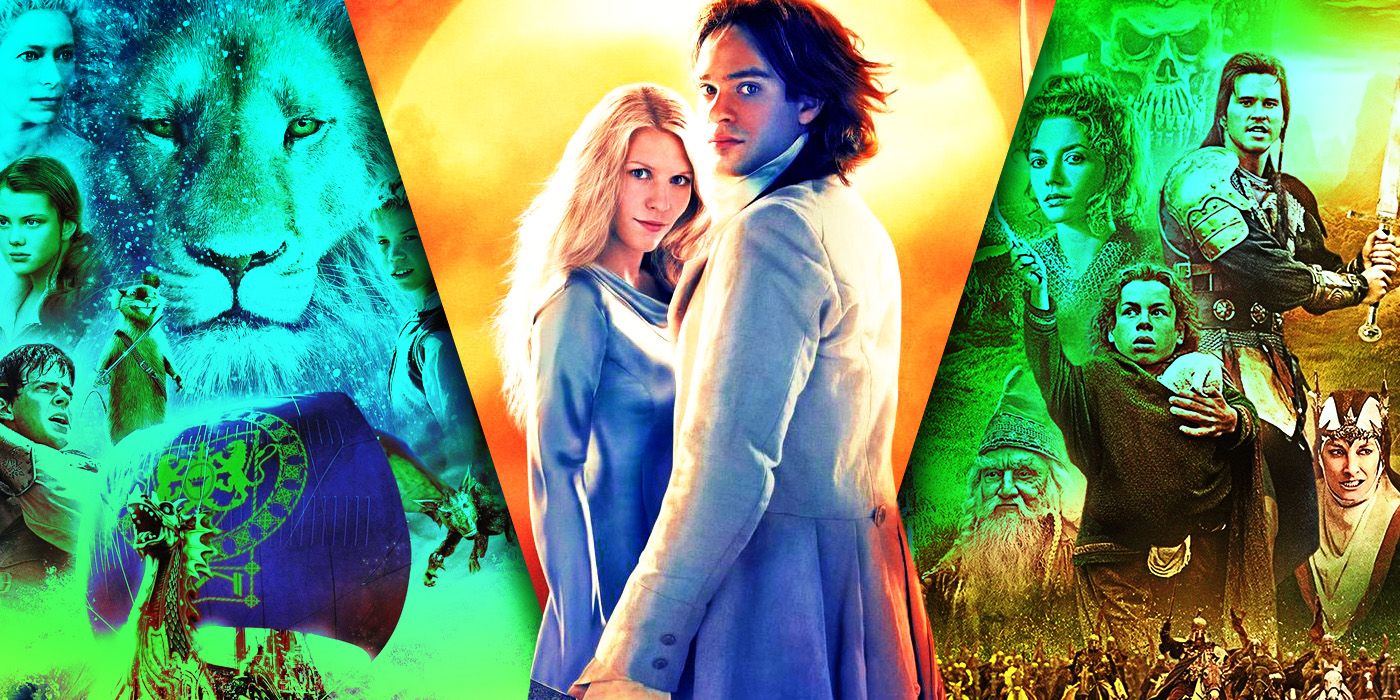
15 Fantasy Movies That Feel Like A Dungeons & Dragons Campaign
Dungeons & Dragons incorporates many elements found in other fantasy films, not just Honor Among Thieves.The Green Knight's bizarre premise works thanks to its modern appeal: the film nails the gritty feel of 1300s England but also subverts well-known knightly conventions. Even if Gawain chose honor, it still likely cost him his head. Early on, Essel asks Gawain why he must strive for greatness instead of goodness. He doesn't reply; Gawain isn't a good man, and his attempts to become great only bring ruin upon him. In The Green Knight, self-destruction acts as a means of redemption.
Gawain only plays the game because of his bruised ego. He misses the solution to the riddle because of it, too. He could've declined to finish the game. The Green Knight never mentions a price to be paid; the consequence could as well have been a mere wound to his pride. When Gawain encounters the ghost of Winifred, she tells him that it was a knight who ravished and killed her. This detail is, perhaps, meant to remind us that greatness is not synonymous with goodness. It's also worth pointing out that it's not Gawain's cowardice that curses him in his vision, but his continued dishonesty and hubris.
Had Gawain been content with goodness, or had he even been willing to admit to mistakes, he may not have doomed the kingdom and lost his life. However, the point The Green Knight makes is that no man is enslaved to either good or evil. Men's morally ambiguous nature is intrinsic, and honor is a choice. Regardless of the failed hero he's been, Gawain either dies like an honorable knight at the hands of the Green Knight or is set free to embrace his own ruin. Alternatively, a more nihilistic take suggests that an honorable death — perhaps even honor itself — is pointless. When Gawain asks the Green Knight if "this is all there is," he laughs and says, "What else would there be?"
A Cautionary Tale About A Mother's Ambitions For Her Son
The most consequential update to this literary classic is the repositioning of Morgan le Fay. Historically, she's a witch and apprentice of Merlin who is Gawain's aunt, not mother. Here, Lowery converges her into one character who sets events into motion. It's Morgan who summons the Green Knight, frustrated by her son's inability to distinguish himself, but it's unclear why and to what extent she's involved after he appears. She could have wanted to test his mettle, to see if he'd show mercy in the game, or any of the other attributes of a true knight on the quest that followed. Alternatively, Morgan could have wanted to give her son an opportunity to rise within the ranks, to gain power by proxy.
A detail fans might have missed in The Green Knight is that Morgan is likely who created the obstacles along Gawain's way. Winifred tells Gawain that the Green Knight is someone he knows. Morgan accesses magic by covering her eyes with a sash, as other women do throughout the film. If she doesn't have a hand in the outcome, she at least has an eye on her son throughout. Others believe she regrets the spell and intervenes by possessing the fox. Either way, this was a time in which women had little agency and were only remembered by the reputation of their sons. By creating the conditions for Gawain to ascend, she may have unwittingly sentenced him to death.
In the original poem, Morgan turns Lord Bertilak de Hautdesert into the Green Knight to test the honorable nature of King Arthur's men. In the movie, she's also pulling all the strings, except that it's open for viewers to interpret whether she's doing it to torment Gawain or save him. While it's true that Gawain stumbles upon multiple obstacles along the way, they are all attached to one final goal.
The Green Knight's Ending Can Have A Lot Of Different Meanings
David Lowery's Latest Movies as a Director:
|
Movie |
Release Date |
IMDb Rating |
|---|---|---|
|
Peter Pan & Wendy |
2023 |
4.4 |
|
The Green Knight |
2021 |
6.6 |
|
The Old Man & the Gun |
2018 |
6.7 |
|
A Ghost Story |
2017 |
6.8 |

10 Best Fantasy Movies That Aren't Based on Fairy Tales
The fantasy genre typically pulls a lot from fairy tales, but some of the best films are entirely original.While chivalric interpretations of The Green Knight could go either way, the film is unabashedly a dire warning to humanity about our treatment of the natural world. The creature is the personification of a tree, and he essentially tells Gawain that he'll treat him as he is treated. Gawain could've been easy on him and lived in peace. Instead, he went for the kill. A contemporary approach to the film's ending is men's propensity to destroy the planet, only to get what they deserve in return.
As he embarks on his journey, Gawain witnesses a forest being felled. When the scavengers abandon him, a dreamlike shot shows the seasons changing and nature reclaiming his body. But the most damning scene is the Lady's monologue, in which she passionately laments that green is the color of rot and that after the violence of humans, green overtakes red. For all of civilization's advancements, both in the 14th and the 21st centuries, nature was there before, will be there after, and is stronger, more magical, and patient than we'll ever be. Viewed this way, The Green Knight is a parable meant to teach us that nature can be our ally or our enemy, and we make it our enemy at our peril.
The Green Knight's ending also addresses life as both a curse and a gift. To Gawain, it's revealed to him through a vision that life will only take him to his doom. He will become King and witness his reign succumb to misery and rage. To be spared by the Green Knight means living the life of a coward. Alternatively, the possibility of death fulfills his journey of honor and regardless of whether the Green Knight spares Gawain or not — the final blow is never seen — what matters in the end is that Gawain made his choice. It's up to the Green Knight's sword to seal it.
It's important to notice that Lowery purposefully decided to only refer to Gawain as a knight in the ending, for it's the Green Knight's praise that earns him the title. Despite its morally ambiguous characters, The Green Knight plays out like a conventional fable. In a great non-MCU post-credits scene, a little girl is seen picking up Gawain's crown, implying that the lessons the hero learned will have to be relearned as generations go by.
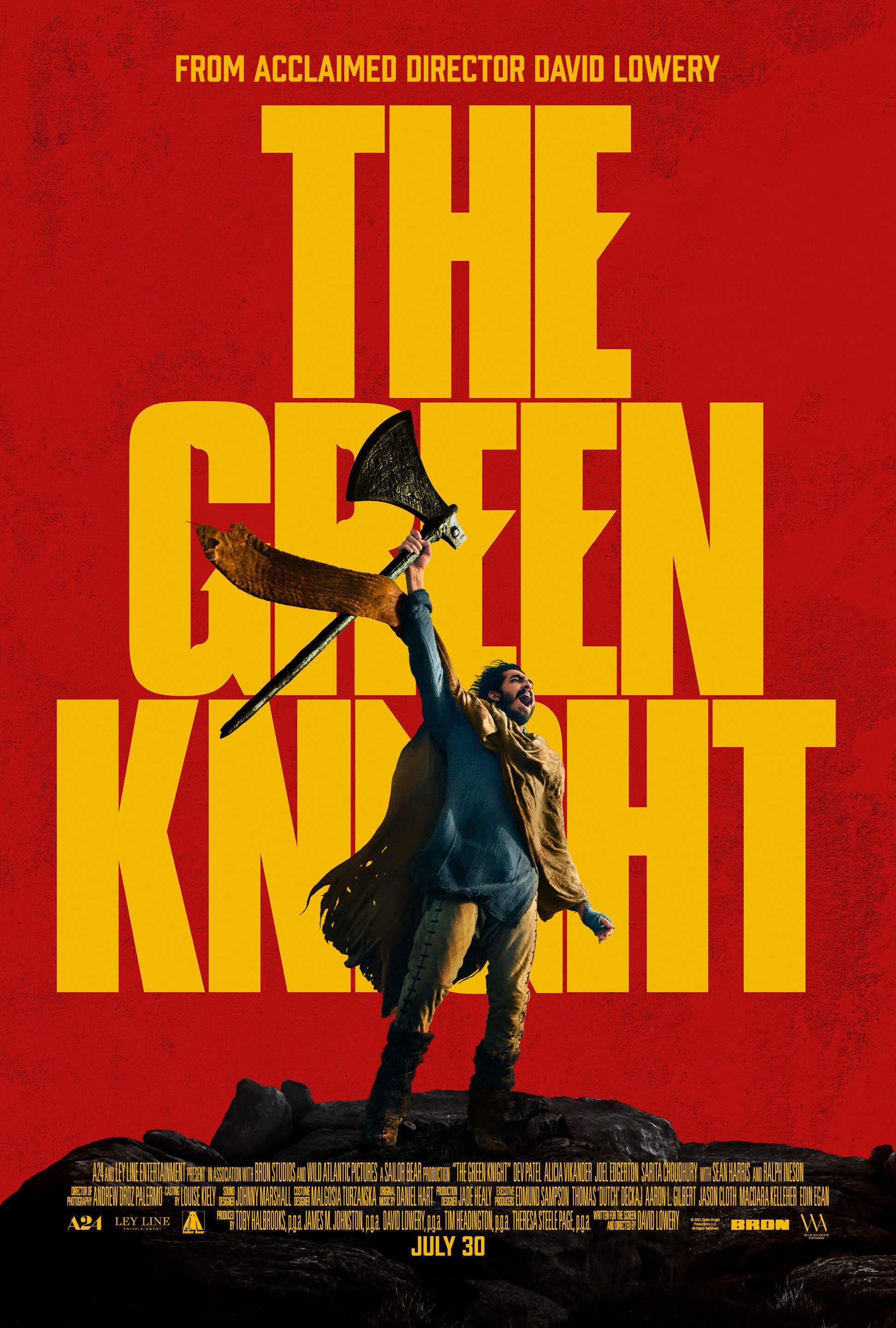
The Green Knight
A fantasy retelling of the medieval story of Sir Gawain and his quest to confront the infamous Green Knight.
- Director
- David Lowery
- Release Date
- July 30, 2021
- Cast
- Dev Patel , Alicia Vikander , Joel Edgerton , Sarita Choudhury , Sean Harris , Ralph Ineson
- Runtime
- 130 minutes
- Main Genre
- Fantasy

